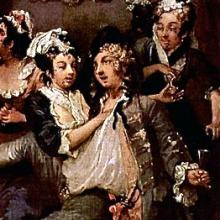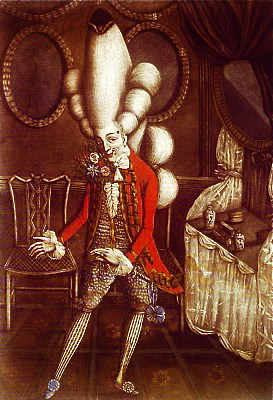
EDINBURGH'S YOUNG MENFOLK LEAVE LOT TO BE DESIRED
Last week, we considered fashion, fripperies, and young ladies' changing education in late 18th-century Edinburgh (Breaking news, 17.2.16).
This week, we look at a concurrent and deplorable turn for the worse in young gentlemen's behaviour. The extracts below, from The Statistical Account of Scotland 1791–1799, are very slightly out of their original order to preserve narrative clarity.
Readers may form their own opinions about any possible connections between growing consumerism and precocious adulthood.
In 1763 — A young man was termed a fine fellow, who, to a well-informed and an accomplished mind, added elegance of manners, and a conduct guided by principle; one who would not have injured the rights of the meanest individual; who contracted no debts that he could not pay; and thought every breach of morality unbecoming the character of a gentleman; — who studied to be useful to society, so far as his opportunity or abilities enabled him.
In 1783 — The term fine fellow was applied to one who could drink three bottles; who discharged all debts of honour, (or game debts and tavern bills), and evaded payment of every other; who swore immoderately, and before ladies, and talked of his word of honour; who ridiculed religion and morality as folly and hypocrisy, (but without argument); who was very jolly at the table of his friend, and would lose no opportunity of seducing his wife, or of debauching his daughter if she was handsome; but, on the mention of such a thing being attempted on his own connections, would have cut the throats, or blown out the brains of his dearest companion, offering such an insult; – who was forward in all the fashionable follies of the time; who disregarded the interests of society, or the good of mankind, if they interfered with his own vicious selfish pursuits and pleasures.
In 1763 — Young ladies (even by themselves) might have walked through the streets of the City in perfect security at any hour. No person would have interrupted, or spoken to them.
In 1783 —The mistresses of boarding schools found it necessary to advertise, that their young ladies were not permitted to go abroad without proper attendants.
In 1783 — The morality of stage-plays, or their effects on society were not thought of. The most crouded houses were always on Saturday-night. The boxes for the Saturday-night's play were generally taken for the season, so that strangers often on that night could not get a place. The custom of taking a box for the the Saturday-night through the season, was much practised by boarding mistresses, so that there could be no choice of the play, but the young ladies coud only take what was set before them by the manager. Impudent buffoons took liberties with authors, and with the audience, in their acting, that would not have been suffered formerly.
The galleries never failed to applaud what they formerly would have hissed, as improper in sentiments, or decorum.
In 1791 — Boys, from bad example at home, and worse abroad, had become forward and insolent. They early frequented taverns, and were soon initiated in folly and vice, without any religious principle to restrain them.
It has been an error of twenty years, to precipitate the education of boys, and make them too soon men.
[Extracted from: Sir John Sinclair (ed.), 1975, The Statistical Account of Scotland 1791–1799, Vol. 2 The Lothians, with a new introduction by T.C. Smout (Wakefield: EP Publishing).]